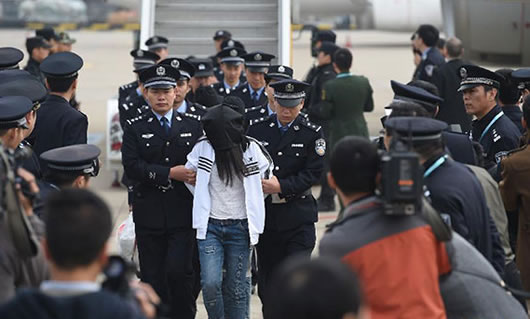The Law on Legal Assistance of Vietnam consists of 7 chapters, 71 articles and takes effect from July 01, 2008.
Chapter I: General provisions on governing scope; subjects of application; application of law; legal assistance principles; language in legal assistance; legal mandate and form of provision of legal assistance; consular legalization and recognition of legal mandate papers or documents.
Chap II: Legal assistance in civil matters includes: scope of civil legal assistance; civil legal mandate dossiers; civil legal assistance documents; requesting foreign countries to provide civil legal assistance; procedures for requesting foreign countries to provide civil legal assistance; procedures to receive and handle civil legal mandates of foreign countries; expenses for provision of civil legal assistance.
Chapter III: Legal assistance in criminal matters includes: scope of criminal legal assistance; criminal legal mandate dossiers; criminal legal mandate documents; requesting foreign countries to provide criminal legal assistance; refusal or postponement of performance of criminal legal mandates of foreign countries; procedures for criminal legal mandates to foreign countries; procedures for receiving and handling criminal legal mandates of foreign countries; service of summons on witnesses, experts; transfer of persons who are serving their imprisonment sentence for supply of evidence; supply of information; use of information and evidence in criminal legal assistance; request for penal liability examination; hand-over of files and material evidence of cases to foreign countries; handling of foreign requests for penal liability examination of Vietnamese citizens in Vietnam; performance of foreign legal mandates for investigation of foreign nationals in Vietnam; expenses for provision of criminal legal assistance.

Chapter IV: Extradition includes: extradition for penal liability examination or judgment enforcement; cases of extradition; non-examination of penal liability, non-extradition to a third country; refusal of extradition to foreign countries; extradition request dossiers; written extradition requests and enclosed documents; receipt of extradition requests; consideration of many countries requests for extradition of one person; extradition decision; precautionary measures for extradition; enforcement of extradition decisions; escorting extradited persons; postponement of enforcement of extradition decisions and temporary extradition; re-extradition; transfer of articles and material evidence related to criminal cases; transit; extradition expenses.
Chapter V: Transfer of current imprisonment servers includes: grounds for transfer of current imprisonment servers; conditions for receipt and transfer of current imprisonment servers; refusal to transfer persons serving their imprisonment penalties; dossiers of request for transfer of current imprisonment servers; written requests for transfer of current imprisonment servers and enclosed documents; receipt of requests for transfer of current imprisonment servers; decision on transfer of persons serving their imprisonment penalties in Vietnam to foreign countries; competence to decide on receipt of persons currently serving their imprisonment penalties in foreign countries back to Vietnam; enforcement of decisions on transfer of current imprisonment servers; continued service of penalties in Vietnam; escort of transferees; expenses for transfer of current imprisonment servers.
Chapter VI: State bodies responsibilities in legal assistance activities include: the Government's responsibilities in legal assistance activities; the Ministry of Justice’s responsibilities; responsibilities of the Supreme People's Court; responsibilities of the Supreme People's Procuracy; responsibilities of the Ministry of Public Security; responsibilities of the Ministry of Foreign Affairs; responsibilities of Vietnamese representative offices in foreign countries; responsibilities of provincial-level People's Courts; responsibilities of provincial-level People's Procuracies; responsibilities of investigating bodies.
* Certain issues in the Law on Legal Assistance of Vietnam
Legal assistance principles: The Law on Legal Assistance of Vietnam is formulated based on the following 02 principles: firstly, legal assistance is provided on the principles of respect for independence, sovereignty and territorial integrity, non-interference into internal affairs of each other, equality and mutual benefit, compliance with Vietnam's Constitution and law and with treaties to which Vietnam is a contracting party; secondly, where there exist no treaties on legal assistance between Vietnam and foreign countries, legal assistance activities follow the principle of reciprocity which, however, do not contravene Vietnamese law and conform to international law and practice.
Content of state management on legal assistance: The law stipulates that the Government is responsible for the unified management of state legal assistance, with the Ministry of Justice acting as the coordinating body to assist the Government in this management. The Ministry of Justice also handles the delegation of legal assistance in civil matters for countries that have signed agreements on legal assistance cooperation with Vietnam, as well as for countries that have not yet signed such agreements. The Supreme People's Procuracy is the coordinating body for the delegation of legal assistance in criminal matters.
The People's Courts have jurisdiction to consider and decide on cases of extradition and transfer of current imprisonment servers according to its competence. The Ministry of Public Security has the authority to receive, transfer, consider and settle foreign countries requests for extradition and transfer of current imprisonment servers; to consider and transfer dossiers to People’s Procuracies, People's Courts and conduct legal assistance activities according to its competence. The Ministry of Foreign Affairs has the authority to assume the prime responsibility for, and coordinate with concerned ministries and branches in, considering and deciding on the application of the reciprocity principle in legal assistance relations with concerned countries.
The competent authority to decide on extradition and transfer of individuals serving prison sentences.
According to the law, provincial-level People's Courts have the authority to consider and decide on the extradition and transfer of current imprisonment servers or to refuse the extradition and transfer of current imprisonment servers.
Source: Bao dien tu Dai bieu nhan dan
- Key word:
- Law on Legal Assistance 2007
 Article table of contents
Article table of contents










.Medium.png)
.Medium.png)
.Medium.png)
.Medium.png)
